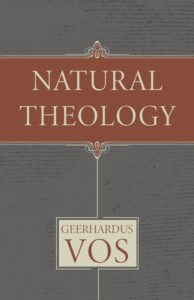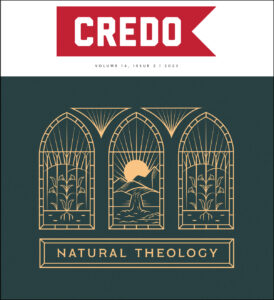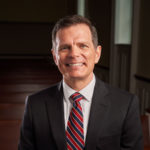
Natural Theology: Vos’s Historical Assessment of the Tradition
T he second issue relates to Vos’s assessment of the Reformed tradition’s understanding of natural theology. In other words, how accurate is Vos’s historiography? Vos’s survey of the history of natural theology is relatively brief, and at times the answers to his questions only lightly touch upon figures and works. He notes that Augustine devoted extensive attention to natural theology and proved God’s existence ontologically and through arguments that appealed to the innate knowledge of God (Q. 17). In his treatment of medieval theology, he makes a common nineteenth-century error by identifying scholasticism with specific theological positions, such as semi-Pelagianism (Q. 21), but he does not paint with such broad strokes so as to eliminate all nuance. While Vos's historiography contains some inaccuracies, on the whole he recognizes continuities and discontinuities between the patristic, medieval, Reformation, and post-Reformation periods. Click To TweetHe rightly recognizes that not all scholastics held the same views regarding faith and reason. Vos identifies Raymond of Sabunde as the father of natural theology (Q. 23.2) and notes that (1) he believed that natural theology must teach that God first exists and must therefore precede revealed theology, (2) that revealed theology teaches us what God says about Himself, and (3) that natural theology teaches us everything that is comprehended in the Bible but that we do not need first to believe everything on the basis of reason (Q. 24).
he second issue relates to Vos’s assessment of the Reformed tradition’s understanding of natural theology. In other words, how accurate is Vos’s historiography? Vos’s survey of the history of natural theology is relatively brief, and at times the answers to his questions only lightly touch upon figures and works. He notes that Augustine devoted extensive attention to natural theology and proved God’s existence ontologically and through arguments that appealed to the innate knowledge of God (Q. 17). In his treatment of medieval theology, he makes a common nineteenth-century error by identifying scholasticism with specific theological positions, such as semi-Pelagianism (Q. 21), but he does not paint with such broad strokes so as to eliminate all nuance. While Vos's historiography contains some inaccuracies, on the whole he recognizes continuities and discontinuities between the patristic, medieval, Reformation, and post-Reformation periods. Click To TweetHe rightly recognizes that not all scholastics held the same views regarding faith and reason. Vos identifies Raymond of Sabunde as the father of natural theology (Q. 23.2) and notes that (1) he believed that natural theology must teach that God first exists and must therefore precede revealed theology, (2) that revealed theology teaches us what God says about Himself, and (3) that natural theology teaches us everything that is comprehended in the Bible but that we do not need first to believe everything on the basis of reason (Q. 24).
When Vos describes the sixteenth-century reception of natural theology, he makes the erroneous claim that the Reformation rejected it, though this description requires some untangling. Vos says,
Was the Reformation favorable to the development of natural theology?
No, for it opposed the Roman Catholic doctrine of tradition as well as the Semipelagianism of the. Roman Catholic church. For that reason, it preferred to stick to Scripture alone and wanted people not to rely on their own powers for their knowledge of God or to seek Him by their own means, but rather simply to believe in God. (Q. 25)
At one level, this description does not accord with the facts; the Reformation did not reject natural theology . At another level, Vos rightly notes that the Reformation rejected Roman Catholic views on tradition and its semi-Pelagian soteriology. A simple survey of key. Reformation confessional documents can substantiate this claim. But to say that the Reformation stuck to Scripture alone does not accord with the evidence. Vos notes that both the Reformed and Lutheran churches only viewed natural theology as nothing more than an apologetic tool for use against unbelievers (Q. 28.1). Moreover, he observes that both Calvin and Philip Melanchthon (1497-1560) treated the subject, though Vos contends that Calvin placed less emphasis on the objective testimony of nature (QQ. 26-27). Such an admission reveals that the Reformátion did not completely reject natural theology. Thus, Vos likely means to say that the Reformation rejected certain forms of Roman Catholic natural theology. The Reformation did not reject natural theology. Click To Tweet That only certain forms were problematic appears to be Vos’s point given the way that he describes Alsted’s work and the internal and external books of nature, a view that echoes the earlier theme of Raymond of Sabunde, which Vos says, “was increasingly lost from sight, to the detriment of natural theology” (Q. 29). The possibility exists, however, that there was an error on either the lecturer’s or student’s part in delivering or recording Vos’s lecture at this point. So, while Vos’s historiography contains some inaccuracies, on the whole he recognizes continuities and discontinuities between the patristic, medieval, Reformation, and post-Reformation periods. He does not completely dismiss natural theology out of hand.
. At another level, Vos rightly notes that the Reformation rejected Roman Catholic views on tradition and its semi-Pelagian soteriology. A simple survey of key. Reformation confessional documents can substantiate this claim. But to say that the Reformation stuck to Scripture alone does not accord with the evidence. Vos notes that both the Reformed and Lutheran churches only viewed natural theology as nothing more than an apologetic tool for use against unbelievers (Q. 28.1). Moreover, he observes that both Calvin and Philip Melanchthon (1497-1560) treated the subject, though Vos contends that Calvin placed less emphasis on the objective testimony of nature (QQ. 26-27). Such an admission reveals that the Reformátion did not completely reject natural theology. Thus, Vos likely means to say that the Reformation rejected certain forms of Roman Catholic natural theology. The Reformation did not reject natural theology. Click To Tweet That only certain forms were problematic appears to be Vos’s point given the way that he describes Alsted’s work and the internal and external books of nature, a view that echoes the earlier theme of Raymond of Sabunde, which Vos says, “was increasingly lost from sight, to the detriment of natural theology” (Q. 29). The possibility exists, however, that there was an error on either the lecturer’s or student’s part in delivering or recording Vos’s lecture at this point. So, while Vos’s historiography contains some inaccuracies, on the whole he recognizes continuities and discontinuities between the patristic, medieval, Reformation, and post-Reformation periods. He does not completely dismiss natural theology out of hand.
This excerpt is from J. V. Fesko’s introduction to Natural Theology by Gerhardus Vos. trans. Albert Gootjes. Grand Rapids: Reformation Heritage Books, 2022. Used by Permission.

